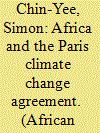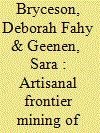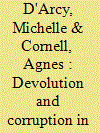|
|
|
Sort Order |
|
|
|
Items / Page
|
|
|
|
|
|
|
| Srl | Item |
| 1 |
ID:
145181


|
|
|
|
|
| Summary/Abstract |
ON 12 DECEMBER 2015, the 195 member states party to the United Nations Framework Convention on Climate Change (UNFCCC) formally adopted the Paris Agreement. This agreement, the culmination of many years of work by thousands of negotiators, scientists, academics, and representatives from civil society, replaces the failed Copenhagen Accord. During the Copenhagen conference in 2009, Lumumba Di-Aping, the then-Ambassador and Deputy Permanent Representative of Sudan to the United Nations in New York, and the Chair of the G77+China group, controversially stated that, ‘You cannot ask Africa to sign a suicide pact, an incineration pact in order to maintain the economic dominance of a few countries’.1 The Copenhagen conference witnessed deep splits amongst African delegates. South Africa was part of the coalition that drafted the final text behind closed doors (with Brazil, India, China, and the USA) and Ethiopia publicly supportive of the Accord, while many other African countries agreed with Di-Aping that it produced a disastrous outcome for the continent. This briefing considers African influence at the twenty-first conference of the parties to the UNFCCC (COP21) and asks whether the final deal is a good one from an African perspective.
|
|
|
|
|
|
|
|
|
|
|
|
|
|
|
|
| 2 |
ID:
145180


|
|
|
|
|
| Summary/Abstract |
We know less about growth and poverty based on numbers in African economies than we would like to think. Numbers are soft, and data availability is sparse, sporadic, and uneven. For researchers and data users, whether engaged in inferential or descriptive statistics, the message is that studying Africa by numbers can be misleading. This research note surveys the knowledge gap and provides guidance on how to and how not to study Africa by numbers.
|
|
|
|
|
|
|
|
|
|
|
|
|
|
|
|
| 3 |
ID:
145178


|
|
|
|
|
| Summary/Abstract |
This article studies the transformative nature of ‘artisanal frontier mining’ in view of sub-Saharan Africa's mining history. Artisanal gold production has generated livelihood earnings for millions of people in sub-Saharan Africa. Yet we must go beyond a study of artisanal mining as an individual livelihood choice and consider the sector's internal dynamics. In this sense, the concept of ‘labour transformation’ is helpful. It refers to a process in which individuals' skill acquisition, economic exchange, psychological reorientation, and social positioning evolve towards a shared occupational identity and collective professional norms, leaving considerable scope for self-governance amongst artisanal miners. This process is captured in the notion of the ‘frontier’, which in our case refers to occupational rather than geographic locational change. However, the frontier is necessarily of limited temporal duration given the existence of gold as a non-renewable resource, the depth of the gold supply sinking beyond the exploratory and extractive reach of artisanal miners, and the expanding interests of foreign mining corporations and the state. Our argument is illustrated through a comparison of the artisanal mining experiences of two neighbouring countries, Tanzania and the Democratic Republic of Congo (DRC), whose artisanal labour patterns are remarkably similar to each other despite their very different national political contexts and the DRC's recent experience of conflict mineral production.
|
|
|
|
|
|
|
|
|
|
|
|
|
|
|
|
| 4 |
ID:
145175


|
|
|
|
|
| Summary/Abstract |
The United Nations-led constitution-making process, while highly controversial, has sought to create an opening to help Somalia transition to a new phase in its political development. This article considers the structural features, problems, and opportunities of the process, particularly in the context of debates over external interventions and state sovereignty. It also addresses an area that is often overlooked during constitution-making: the role of media and communications in advancing narratives that not only shape perceptions, but also define the scope of the debate. International actors have worked to promote legitimating narratives, emphasizing certain aspects and values with a focus on the constitution being ‘Somali-owned’. This article shows how local and private media treated and reshaped these emphases and priorities. At this stage it is not possible to conclude whether efforts to “sell” the constitution have generated greater legitimacy, but what is clear is that the narratives that have dominated public discourse have been focused on participation and politicking, reflecting underlying concerns about which groups will have access to state resources, as well as responding to the interventions by international actors. This emphasis has obscured the role of local legal cultures and previous experiences with grassroots constitution-making processes and reconciliation in the Somali territories that might allow for the reimagining of the nation.
|
|
|
|
|
|
|
|
|
|
|
|
|
|
|
|
| 5 |
ID:
145176


|
|
|
|
|
| Summary/Abstract |
How does decentralization affect patronage and rent seeking? While centralization is seen as enabling these practices, many expect decentralization to reduce them. With few examples of meaningful reform it is difficult to establish if this is the case in the context of African states. We look at the impact of decentralization on rent seeking and patronage in Kenya, where the devolution of significant powers to county governments has recently taken place. We suggest that devolution has not removed these practices but rather brought them down to the local level in response to popular expectations that it is “everyone's turn to eat”. The realization of this expectation for a broad constituency of ethnic groups and elites has facilitated – so far – the embedding of these reforms. Our findings thus suggest that the implementation of meaningful decentralization has been achieved via the decentralization of patronage networks, meaning that the “our turn to eat” character of ethnic patronage politics persists. As a result, although a greater number of groups now have their turn, ethnic minorities within some counties feel marginalized, including certain trapped minorities from politically relevant groups.
|
|
|
|
|
|
|
|
|
|
|
|
|
|
|
|
| 6 |
ID:
145179


|
|
|
|
|
| Summary/Abstract |
Many studies have examined the significant involvement of Christian organizations in national-level politics since the revitalization of democracy in Africa in the 1990s, but few have focused on local faith-based organizations engaged in grassroots citizen mobilization. This article compares two such organizations rooted in local communities in Zambia and South Africa in order to elucidate their role. On the basis of interviews, document analysis, and participant observations conducted in 2011, 2013, and 2014, we find that the greater the autonomy a Pentecostal organization enjoys from external partners and the more independence its leader enjoys in decision making, the more likely it is to engage in local citizenship mobilization. However, while these structural factors may facilitate change, they are unlikely to result in new political strategies being pursued unless they are combined with a form of visionary leadership that seeks to promote citizenship. Our findings explain new forms of Pentecostal political involvement, particularly at the grassroots level, by showing how some leaders have used their churches' autonomous structures to promote political engagement.
|
|
|
|
|
|
|
|
|
|
|
|
|
|
|
|
| 7 |
ID:
145174


|
|
|
|
|
| Summary/Abstract |
Since the late 1990s Zimbabwean politics has been shaped by the political succession war raging within the ruling ZANU PF party. The internal fight to succeed President Robert Mugabe pitted a faction controlled by retired General Solomon Mujuru, who was fronting his wife Joice Mujuru, against another faction led by Emmerson Mnangagwa, a government minister. The competition between these factions reached a crucial stage in 2014, when Mugabe dismissed Joice Mujuru as Vice-President and purged her key allies in ZANU PF and the government. This article examines the role of state intelligence in this struggle, arguing that the Military Intelligence (MI) leadership, which supported Mnangagwa in the succession conflict, placed Joice Mujuru under surveillance and constructed a controversial gendered case to destroy her bid to succeed Mugabe. In contrast, some elements in the principal civilian intelligence institution, the Central Intelligence Organization, conducted a surveillance operation against the Mnangagwa faction in order to support Joice Mujuru's power bid. The article widens scholarship on the security sector's political interventions in Zimbabwean politics, while emphasizing how the gendered dimensions of surveillance can reinforce patriarchal national politics.
|
|
|
|
|
|
|
|
|
|
|
|
|
|
|
|
| 8 |
ID:
145177


|
|
|
|
|
| Summary/Abstract |
Land dispossession and conflicts over land compound resettlement efforts in post-conflict contexts. This is particularly true in rural sub-Saharan African countries, where the vast majority of livelihoods depend on maintaining access and rights to cultivable land. This article engages in the active debate on this topic using ethnographic research conducted in the Teso region in eastern Uganda during 2012 and 2013. The Teso region experienced three violent conflicts from the late 1960s to the mid-2000s, which at times were overlapping: large-scale cattle rustling, a civil war, and an insurgency. The research focuses on Amuria District, Katakwi District, and Tisai Island in Kumi District in order to consider three interrelated phenomena: the cyclical nature of the displacement-resettlement process, the intra-regional differences in how this process has unfolded, and the particular ways in which struggles over land are deeply embedded within the post-conflict context. The article argues that post-conflict rearrangements in property relations create complex challenges for resettling populations, and if left unaddressed will merely result in increasingly unstable land tenure regimes. It also argues that struggles over land in Teso should not be understood solely through a post-conflict lens, as there are a variety of drivers – some not tied directly to the violent conflicts – that interact with post-conflict dynamics to create a perfect storm for land tenure instability.
|
|
|
|
|
|
|
|
|
|
|
|
|
|
|
|
|
|
|
|
|